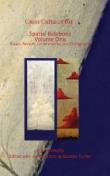AustLit
Latest Issues
AbstractHistoryArchive Description
'These volumes present John Kinsella's uncollected critical writings and personal reflections from the early 1990s to the present. Included are extended pieces of memoir written in the Western Australian wheatbelt and the Cambridge fens, as well as acute essays and commentaries on the nature and genesis of personal and public poetics. Pivotal are a sense of place and how we write out of it; pastoral's relevance to contemporary poetry; how we evaluate and critique (post)colonial creativity and intrusion into Indigenous spaces; and engaged analysis of activism and responsibility in poetry and literary discourse. The author is well-known for saying he is preeminently an "anarchist, vegan, pacifist" - not stock epithets, but the raison d'être behind his work. The collection moves from overviews of contemporary Australian poetry to studies of such writers as Randolph Stow, Ouyang Yu, Charmaine Papertalk-Green, Lionel Fogarty, Les Murray, Peter Porter, Dorothy Hewett, Judith Wright, Alamgir Hashmi, Patrick Lane, Robert Sullivan, C.K. Stead, and J.H. Prynne, and on to numerous book reviews of poetry, fiction, and non-fiction, originally published in newspapers and journals from around the world. There are also searching reflections on visual artists (Sidney Nolan, Karl Wiebke, Shaun Atkinson) and wide-ranging opinion pieces and editorials. In counterpoint are conversations with other writers (Rosanna Warren, Rod Mengham, Alvin Pang, and Tracy Ryan) and explorations of schooling, being struck by lightning, 'international regionalism', hybridity, and experimental poetry. This two-volume argosy has been brought together by scholar and editor Gordon Collier, who has allowed the original versions to speak with their unique informal-formal ductus. Kinsella's interest is in the ethics of space and how we use it. His considerations of the wheatbelt through Wagner and Dante (and rewritings of these), and, in Thoreauvian vein, his 'place' at Jam Tree Gully on the edge of Western Australia's Avon Valley form a web of affirmation and anxiety: it is space he feels both part of and outside, em¬braced in its every magnitude but felt to be stolen land, whose restitution needs articulating in literature and in real time. Beneath it all is a celebration of the natural world - every plant, animal, rock, sentinel peak, and grain of sand - and a commitment to an ecological poetics.' (Publication summary)
Publication Details of Only Known VersionEarliest 2 Known Versions of
Works about this Work
-
John Kinsella, International Regionalism, and World Literature
2021
single work
criticism
— Appears in: Angelaki , vol. 26 no. 2 2021; (p. 81-91)'This article focuses on the question of John Kinsella’s invisibility in World Literature from the perspective of his International Regionalism (IR). First, it compares the similarity and difference between Kinsella and Joseph S. Nye’s international regionalism, and pinpoints the development of Kinsella’s IR from Disclosed Poetics, Activist Poetics, Spatial Relations to Polysituatedness. Second, it concentrates on analyzing the background of Kinsella’s IR through three kinds of ideologies: veganism, anarchism, and pacifism, in order to mark the unique identity problem of Kinsella – identity dilemma in-between pre- and post-nation as Australia. Third, it clarifies the reason why Kinsella is invisible in the World Literature canon as Emily Apter mentions in “On Translation in a Global Market,” in line with the question why Kinsella was mainly in the footnotes of Robert Dixon and Brigid Rooney’s Scenes of Reading: Is Australian Literature a World Literature. In conclusion, on the one hand, Kinsella’s IR about the World and Literature does not fit in the Center, or the Periphery, nor the Semi-Center & Periphery; on the other hand, Kinsella’s IR might more aptly be termed International Community-ism, because Kinsella’s World is built up by very small communities.' (Publication abstract)
-
John Kinsella's Wild Ecology of Thought
2015
single work
review
— Appears in: Australian Poetry Journal , vol. 5 no. 1 2015; (p. 139-145)
— Review of Spatial Relations. Volume One: Essays, Reviews, Commentaries, and Chorography 2013 selected work criticism
-
John Kinsella's Wild Ecology of Thought
2015
single work
review
— Appears in: Australian Poetry Journal , vol. 5 no. 1 2015; (p. 139-145)
— Review of Spatial Relations. Volume One: Essays, Reviews, Commentaries, and Chorography 2013 selected work criticism -
John Kinsella, International Regionalism, and World Literature
2021
single work
criticism
— Appears in: Angelaki , vol. 26 no. 2 2021; (p. 81-91)'This article focuses on the question of John Kinsella’s invisibility in World Literature from the perspective of his International Regionalism (IR). First, it compares the similarity and difference between Kinsella and Joseph S. Nye’s international regionalism, and pinpoints the development of Kinsella’s IR from Disclosed Poetics, Activist Poetics, Spatial Relations to Polysituatedness. Second, it concentrates on analyzing the background of Kinsella’s IR through three kinds of ideologies: veganism, anarchism, and pacifism, in order to mark the unique identity problem of Kinsella – identity dilemma in-between pre- and post-nation as Australia. Third, it clarifies the reason why Kinsella is invisible in the World Literature canon as Emily Apter mentions in “On Translation in a Global Market,” in line with the question why Kinsella was mainly in the footnotes of Robert Dixon and Brigid Rooney’s Scenes of Reading: Is Australian Literature a World Literature. In conclusion, on the one hand, Kinsella’s IR about the World and Literature does not fit in the Center, or the Periphery, nor the Semi-Center & Periphery; on the other hand, Kinsella’s IR might more aptly be termed International Community-ism, because Kinsella’s World is built up by very small communities.' (Publication abstract)




